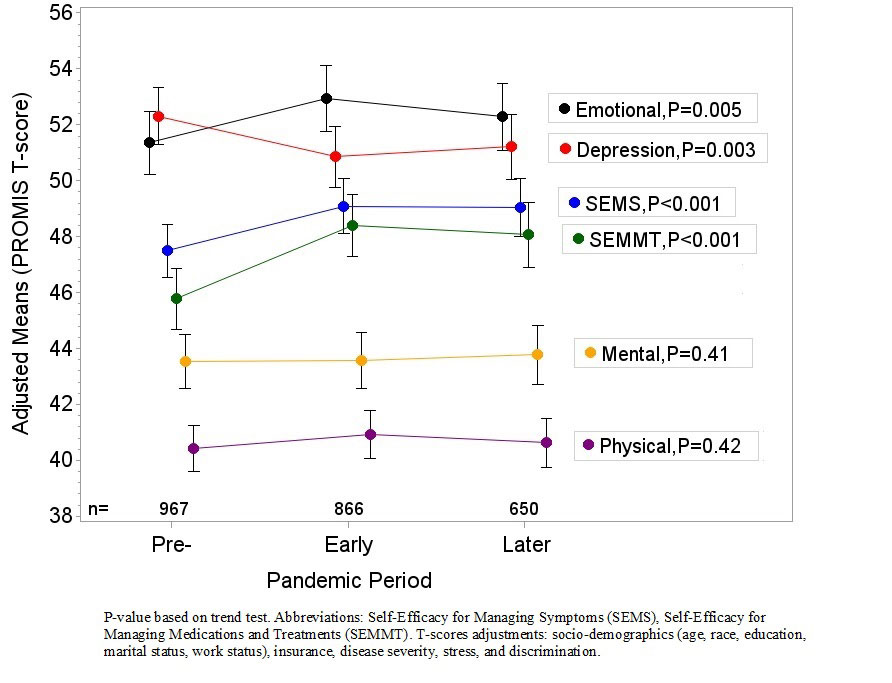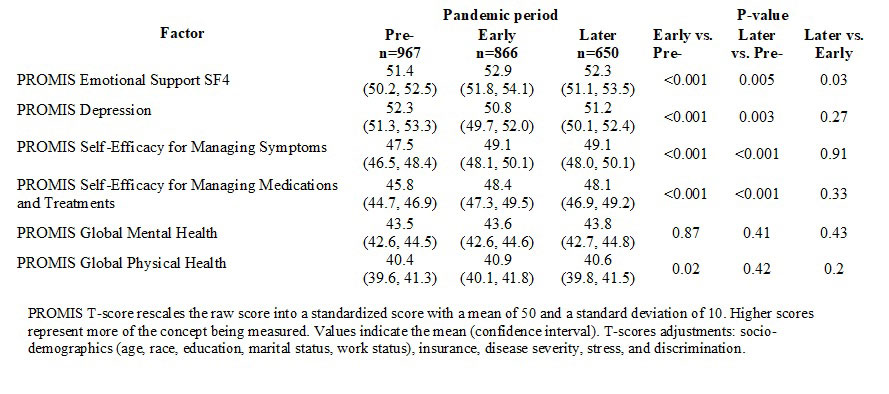Session Information
Session Type: Poster Session D
Session Time: 1:00PM-3:00PM
Background/Purpose: The COVID-19 pandemic may have a sustained impact on systemic lupus erythematosus (SLE) patients in multiple ways. In a large predominantly Black SLE cohort, we explored trends in lupus disease activity, general health, and psychosocial factors at 3-time points: pre-pandemic, early pandemic, and later pandemic.
Methods: We examined longitudinal data from people with SLE enrolled in the Georgians Organized Against Lupus (GOAL), a population-based cohort of adults from Atlanta, Georgia. All participants fulfilled 3 or more ACR classification criteria and had a final diagnosis of SLE by a board-certified rheumatologist. This study focused on participants who completed one survey before (2017-2019) and another survey during the early pandemic (2020-2021) and/or later in the pandemic (2022). We explored changes in SLE disease activity, health, and psychosocial elements with the following validated and self-administered measures: Systemic Lupus Activity Questionnaire (SLAQ), PROMIS short forms (Global Physical and Mental Health, Depression, Emotional Support, Self-Efficacy for Managing Symptoms, Self-Efficacy for Managing Medications and Treatments), Everyday Discrimination Scale, and Cohen’s Perceived Stress Scale. Trend analysis was performed on T-scores to identify patterns after adjusting for socio-demographic (age, sex, race, education, marital status, work status), insurance status, disease damage, stress, and discrimination.
Results: We evaluated 967 participants (94% women, 82% Black, mean age 47). SLE-related characteristics included an average age of diagnosis of 32.1 years (SD ± 11.8), an average disease duration of 15.4 years (SD ± 10.3), and over 60% with severe organ damage based on the Self-administered Brief Index of Lupus Damage (score ≥ 3). Overall, there were no significant changes in health insurance coverage, mental healthcare (visits to a psychiatrist, psychologist, or counselor), or disease activity during the pandemic. Self-efficacy measures improved during the pandemic compared to pre-pandemic. Emotional support increased, and depression decreased significantly in both early and later in the pandemic, compared to pre-pandemic. However, these measures remained similar when early and later pandemic data were compared. (Figure) After adjustments for confounders, mean scores for emotional support and self-efficacy remained significantly better during the pandemic than before the pandemic. Both mental health and physical health remained consistently low during all time points, although there was an upward trend in physical health during the early pandemic. (Table)
Conclusion: Our findings underscore that during the challenging period of the COVID-19 pandemic, participants of a SLE cohort with significant social and health vulnerabilities reported improved confidence to manage symptoms, medications, and other treatments. Trends show that participants received more emotional support and reported less depression during the pandemic than pre-pandemic. However, there were no significant changes in the overall global mental and physical health trends.
To cite this abstract in AMA style:
Dunlop-Thomas C, Bao G, Williams J, Lim S, Drenkard C. Psychosocial and Health Measures in Systemic Lupus Erythematosus: COVID-19 Pandemic Trends in the Georgians Organized Against Lupus Cohort [abstract]. Arthritis Rheumatol. 2022; 74 (suppl 9). https://acrabstracts.org/abstract/psychosocial-and-health-measures-in-systemic-lupus-erythematosus-covid-19-pandemic-trends-in-the-georgians-organized-against-lupus-cohort/. Accessed .« Back to ACR Convergence 2022
ACR Meeting Abstracts - https://acrabstracts.org/abstract/psychosocial-and-health-measures-in-systemic-lupus-erythematosus-covid-19-pandemic-trends-in-the-georgians-organized-against-lupus-cohort/


